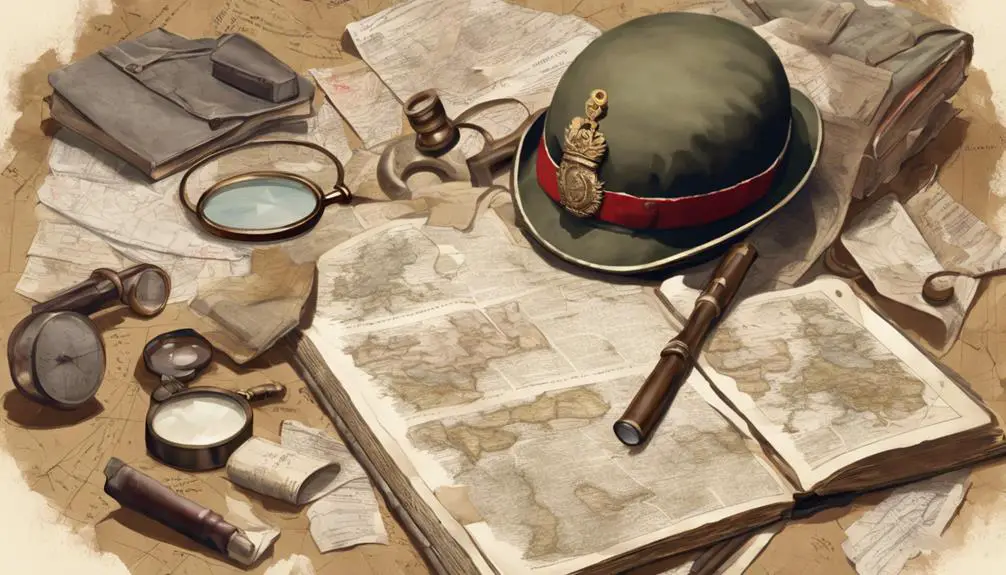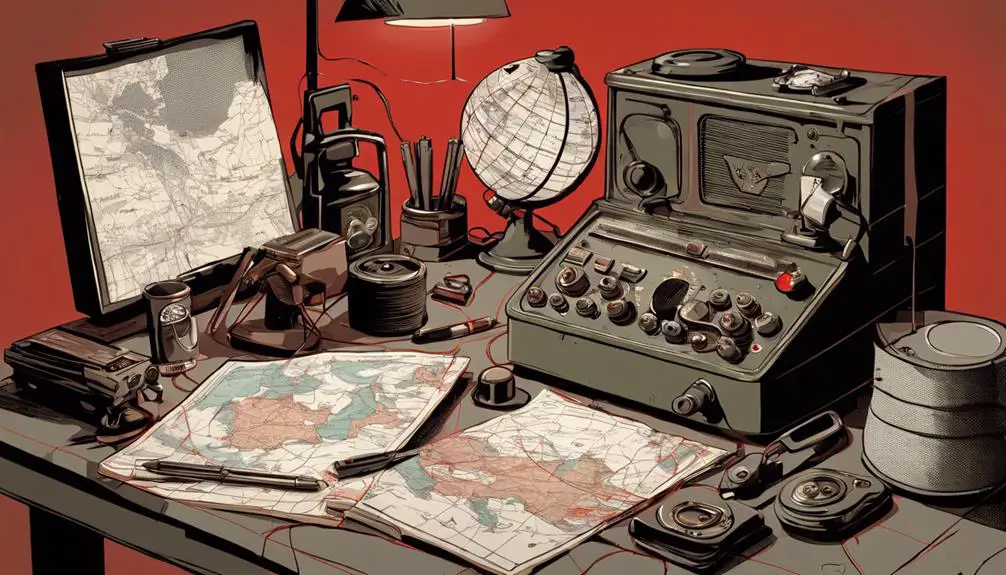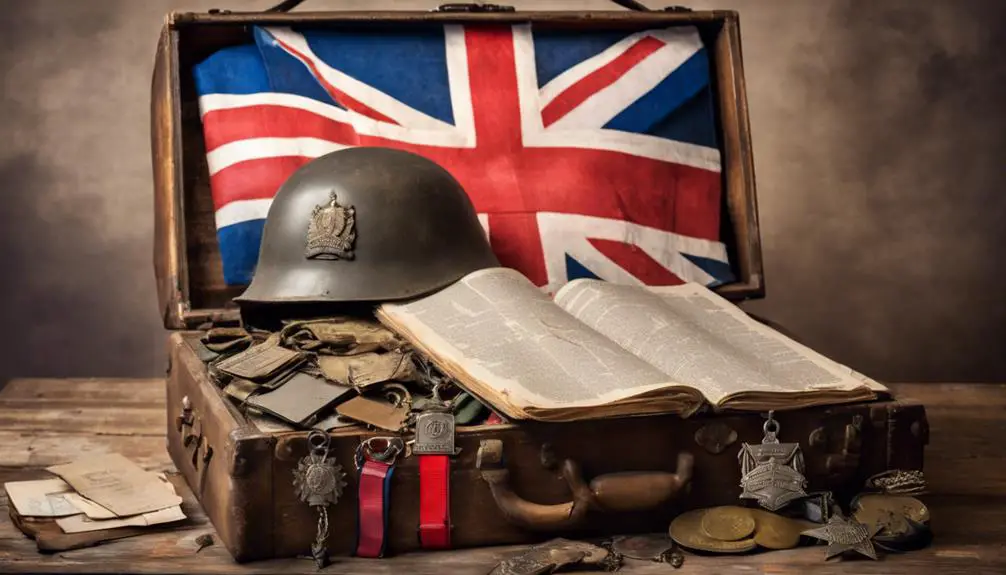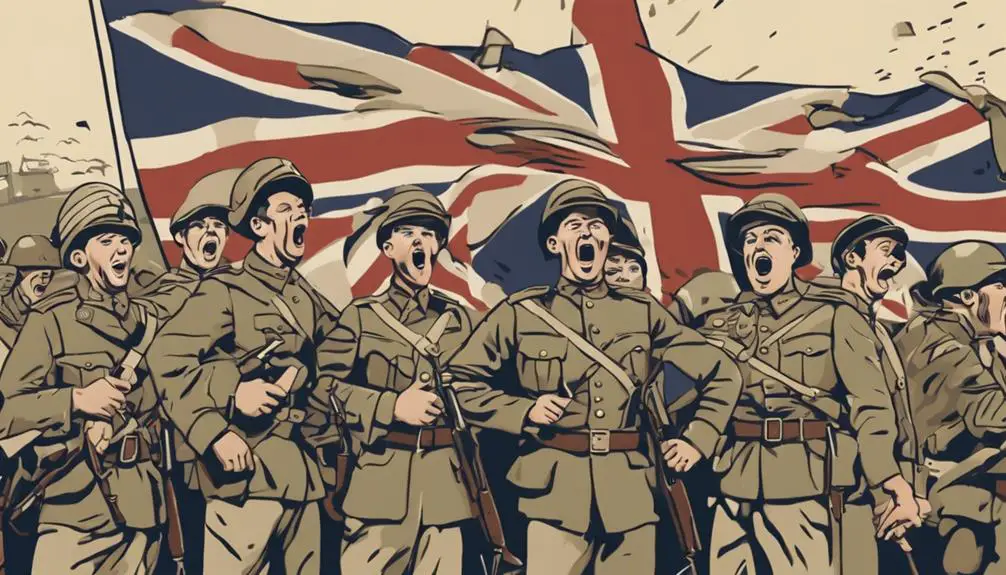As you explore British military terms and soldier slang, you'll discover a rich history shaped by centuries of conflict and cultural exchange. From "Squaddie" and "Gutted" to code words like "BATCO," the military's communication framework is built on a unique blend of languages and dialects. You'll find that different ranks have their own distinct dialects, reflecting social class and hierarchical structure. As you dig deeper, you'll uncover the evolution of military lingo, adapted to changing warfare and demographics, and enriched by cultural influence. And that's just the beginning – there's more to uncover in this fascinating world of military terminology.
Origins of Military Slang

As you investigate the fascinating world of British military terminology, it becomes clear that the origins of military slang are deeply rooted in the country's rich military history, with linguistic influences dating back to the 17th century.
You'll discover that the historical roots of military slang are closely tied to the cultural influences of the time. For instance, during the English Civil War, soldiers adopted terms from various dialects and regional languages, which eventually evolved into distinct military slang.
The cultural influence of colonialism also played a significant role in shaping military terminology. As British forces expanded their territories, they borrowed words and phrases from local languages, incorporating them into their military vocabulary. This blend of languages and dialects resulted in a unique linguistic landscape, characteristic of British military slang.
As you explore further into the origins of military slang, you'll uncover a complex web of historical and cultural influences that have contributed to its development. By examining these roots, you'll gain a deeper understanding of the language and its significance within the British military.
Common Terms and Phrases
Explore the world of British military terminology, and you'll encounter a plethora of common terms and phrases that have become an integral part of military culture. As you investigate further, you'll realize that military jargon and soldier lingo are an essential part of the military's communication framework.
You'll hear phrases like 'Squaddie' to refer to a soldier, 'Gutted' to express disappointment, and 'Binned' to describe something that's been cancelled. You might even come across 'Mucker' to describe a close friend or 'Scran' to refer to food.
These phrases have become an integral part of the military's social fabric, allowing soldiers to quickly convey complex ideas and emotions in high-pressure situations. Military jargon has evolved over time, incorporating colloquialisms, slang, and regional dialects. It's not uncommon to hear soldiers use terms like 'Oscar Mike' to indicate they're on the move or 'Wait Out' to signal a delay.
Code Words and Abbreviations

In the British military, you'll frequently come across code words and abbreviations that serve as a shorthand for complex information, allowing soldiers to convey critical details quickly and efficiently in high-stress situations. These code words and abbreviations are essential for effective communication, ensuring that crucial information is transmitted rapidly and accurately.
Crypto communication relies heavily on these codes and abbreviations, as they enable secure transmission of sensitive information. For instance, the British military uses the 'BATCO' acronym to denote a battalion commander, while 'COBRA' stands for a crisis operations and briefing room for evaluating situations.
It's intriguing to explore the origins of these acronyms, which often stem from a combination of words or phrases. Understanding the origins of these codes and abbreviations provides valuable insight into the military's communication strategies.
Slang in Different Ranks
As you explore the world of British military slang, you'll notice that different ranks have their own distinct dialects. How do different ranks within the British military influence the slang used by soldiers, and what do these variations reveal about the social dynamics and cultural nuances within the armed forces?
The answer lies in the complex web of rank dialectics. Officer colloquialisms, for instance, often reflect their higher education and refined upbringing, using more polished language and avoiding profanities. Junior ranks, on the other hand, tend to use more colloquialisms and regional dialects, reflecting their diverse backgrounds.
This disparity in language use isn't just a reflection of social class but also of the military's hierarchical structure. The unique slang used by each rank reveals the subtle power dynamics at play, with officers using language to assert authority and junior ranks using it to establish camaraderie.
Evolution of Military Lingo

Through a complex interplay of historical events, technological advancements, and cultural exchange, British military lingo has undergone significant transformations, adapting to the changing nature of warfare and the shifting demographics of the armed forces. As you explore the evolution of military lingo, you'll discover that language adaptation has played an essential role in shaping the vocabulary of British soldiers.
- Cultural influence from colonialism and international deployments has introduced new words and phrases, enriching the military lexicon.
- The impact of technological advancements, such as radio communication and digital platforms, has led to the creation of new terminology and abbreviations.
- The influx of women and individuals from diverse backgrounds has contributed to a more inclusive language, reducing gender-specific and culturally insensitive terms.
- The need for secrecy and coded communication during wartime has driven the development of cryptic language and ciphers, adding another layer of complexity to military lingo.
Throughout this evolution, British military lingo has demonstrated a remarkable ability to adapt, incorporating new words, phrases, and meanings while retaining its unique identity.
Frequently Asked Questions
Are Military Slang and Jargon Used Exclusively by British Soldiers?
You might assume that military slang and jargon are exclusive to British soldiers, but that's not entirely true.
While it's true that each country's military develops its own unique lingo, the use of slang and jargon isn't limited to British soldiers.
Historically, military slang has evolved across cultures, reflecting the cultural significance of military service.
The use of slang and jargon serves as a way to create camaraderie, establish identity, and even cope with the stresses of war.
Do Military Terms Vary Across Different Branches of the Armed Forces?
As you explore the military, you'll notice that terms vary across different branches of the armed forces. You'll find that branch differences and unit variations exist, even within the same country.
For instance, the Army, Navy, and Air Force each have their unique terminology, reflecting their distinct roles and cultures. Additionally, unit variations emerge, such as differences between infantry and artillery units. These variations add complexity, but also allow for specialized communication within each branch and unit.
Can Civilians Use Military Slang Without Being Considered Disrespectful?
You might be surprised to know that 70% of civilians have used military slang in casual conversations. Now, you're wondering if using military slang without being a veteran is disrespectful.
The answer lies in appropriation concerns and cultural sensitivity. When using military slang, consider the context and intent behind it. If you're using it to mock or trivialize the military experience, it's inappropriate. However, if you're using it to show respect and appreciation, it's more acceptable.
Be mindful of the language you use and the audience you're speaking to.
Is Military Slang Used More in Combat Zones or in Everyday Life?
You're wondering if military slang is used more in combat zones or everyday life.
In reality, the frequency of slang usage varies depending on the situation. On the frontline, you'll hear slang more frequently due to high-stress, fast-paced environments where concise communication is essential.
In contrast, barrack banter is more prevalent in everyday life, where slang is used to bond and establish camaraderie among troops.
Are Military Slang and Terminology Taught in Basic Training?
You're standing at attention, sweat dripping down your face, as your Drill Instructor bellows orders in your ear. You're in basic training, where military slang and terminology are drilled into your psyche.
Your instructors use tried-and-true training methods to teach you the lingo, from 'Hooah' to 'SITREP'. It's not just about memorization; you're learning a language that'll become second nature on the battlefield.
The question is, are you being taught military slang and terminology in this intense, immersive environment? The answer is a resounding 'yes'.
Conclusion
As you stand down from your journey through the ranks of British military slang, remember that the lingo is more than just a collection of words – it's a badge of honor, a symbol of camaraderie, and a tribute to the unbreakable bonds forged in the trenches.
Like a well-worn beret, it's been shaped by the hands of history, and its creases tell the story of those who've worn it before you.







